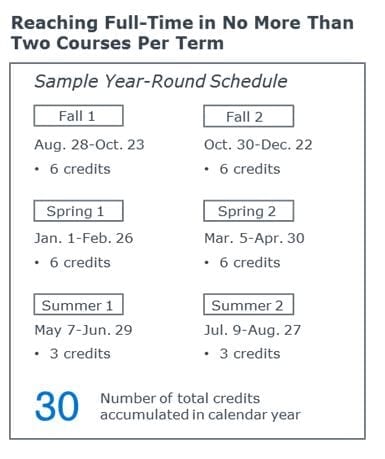Reduce time to degree with default mini-mesters
Consider this paradox: Average community college students complete their associate degrees with at least 21 excess credits, but over 70% of students take less than 12 credits per semester. The key to this paradox? Time. Some students take upwards of eight years to complete their degree.
Unfortunately, this may be as fast as some students can go. They commute to campus, work more than 25 hours a week, and look after their families. It’s no wonder that 15 credits per semester feels impossible. Consequently, students take fewer credits per term, extend their time to degree, and increase their risk for stopping out as life interferes.
Flexing the academic calendar to accommodate your students
The rigid academic calendar serves as the root cause for many of these stop-outs. Most colleges only offer two main terms and an under-utilized summer period to gain credit. Recent initiatives like “15 to Finish” encourage some students to take more credits, but it does not help your part-time students find ways to meld a centuries old academic calendar with their hectic schedule.
In response, progressive community colleges have introduced “mini-mesters,” or accelerated terms, to give students more flexibility and opportunities to accumulate credit. These courses typically last 7-8 weeks and actually boast higher completion rates than their 16-week counterparts. In fact, since EAB first profiled Trident Technical College’s “mini-mester” practice in 2014, their course completion rates have continued to climb.

Making the flexible model year-round
When Amarillo College in Texas introduced mini-mesters to their students, they were stunned by its immediate impact on student success, particularly for adult learners. The college saw a 30 percentage point increase in course completion rates compared to the standard 16 week course, and found that as their students accumulated more credits, they completed at almost a 100% rate.
Result of Amarillo College’s move to default mini-mester schedule

Amarillo College now plans to make mini-mesters the automatic, year-round schedule. In practice, students would take two mini-mesters in fall, spring, and summer. This means that students would take no more than six credits per term and still earn 30 credits in a single academic year.

Facilitating adoption on your campus
Administrators at Amarillo College did not find the change as disruptive as they expected. For example, only 30% of their full-time faculty needed to increase their teaching load by one course. Unsurprisingly, the new calendar format did come with some initial expense. Specifically, they increased summer pay rates from 75% to 100% to incent more teaching capacity. Nonetheless, administrators concluded these investments were small prices to pay given the projected boosts to completion and revenue.
More Resources

The Future of College Graduates in the AI Workforce

5 Insights About Changing Student Preferences
